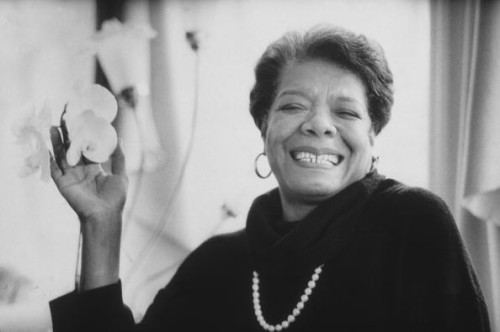Maya Angelou on writing, art, and inspiration
In these days following the killings in Isla Vista, I’ve been in a bit of a fog trying to process the tremendous loss and complex implications of the shooter’s motivations and words. In this wake of bitterness, sorrow, and frustration, I felt an even greater, yet unrelated sadness when I heard that Dr. Maya Angelou passed this morning.
However, in rereading some of my favorite Angelou passages and interviews, I found a ray of light through these heavy, dark clouds. Her words are an inspiration and reminder to hang on during the hard times, to persevere and prosper, and to always live in love.
“I’ve learned that no matter what happens, or how bad it seems today, life does go on, and it will be better tomorrow. I’ve learned that you can tell a lot about a person by the way he/she handles these three things: a rainy day, lost luggage, and tangled Christmas tree lights. I’ve learned that regardless of your relationship with your parents, you’ll miss them when they’re gone from your life. I’ve learned that making a “living” is not the same thing as making a “life.” I’ve learned that life sometimes gives you a second chance. I’ve learned that you shouldn’t go through life with a catcher’s mitt on both hands; you need to be able to throw something back. I’ve learned that whenever I decide something with an open heart, I usually make the right decision. I’ve learned that even when I have pains, I don’t have to be one. I’ve learned that every day you should reach out and touch someone. People love a warm hug, or just a friendly pat on the back. I’ve learned that I still have a lot to learn. I’ve learned that people will forget what you said, people will forget what you did, but people will never forget how you made them feel.”
Another two favorite favorite moments on writing, words, and the power of language from a 1990 interview in The Paris Review:
“When I’m writing, I am trying to find out who I am, who we are, what we’re capable of, how we feel, how we lose and stand up, and go on from darkness into darkness. I’m trying for that. But I’m also trying for the language. I’m trying to see how it can really sound. I really love language. I love it for what it does for us, how it allows us to explain the pain and the glory, the nuances and the delicacies of our existence. And then it allows us to laugh, allows us to show wit. Real wit is shown in language. We need language.”
“I really am trying to do something with autobiography now. It has caught me. I’m using the first-person singular and trying to make that the first-person plural, so that anybody can read the work…”


